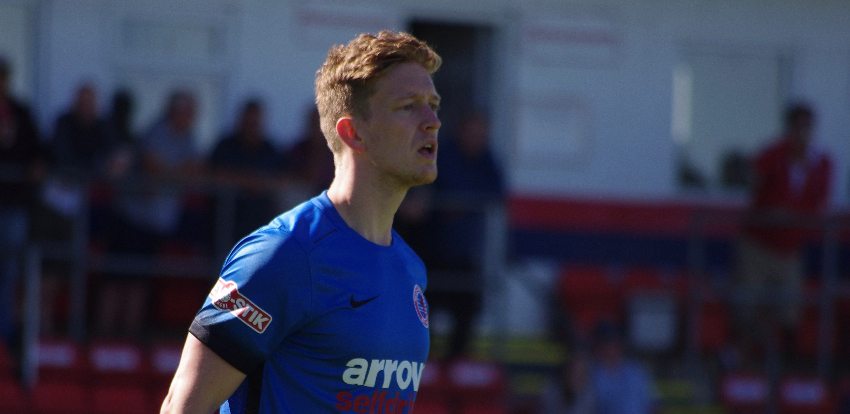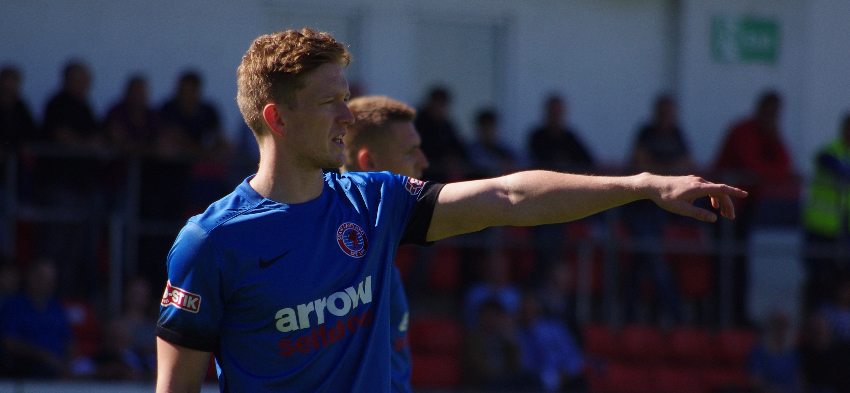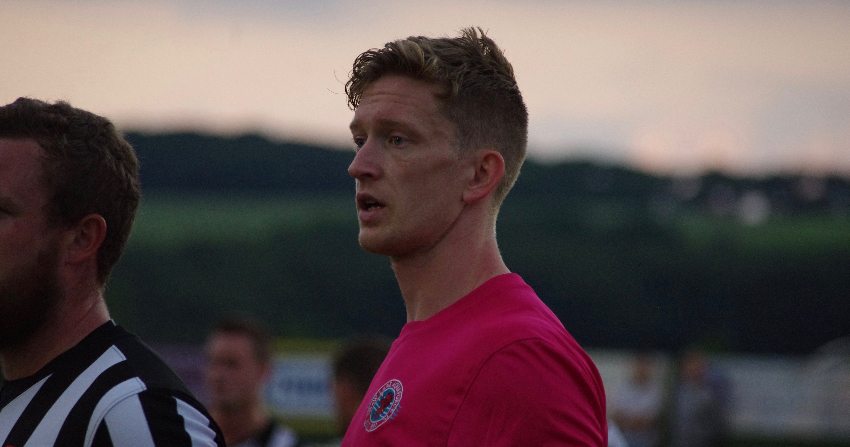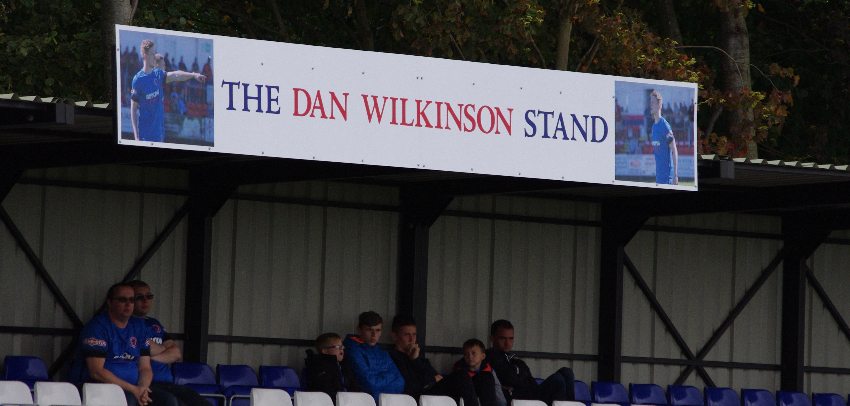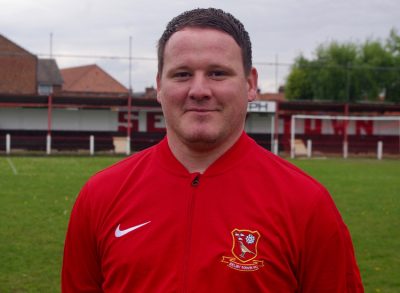
Selby Town manager Christian Fox
You may have recently read our ‘A day in the life of a Non League manager – Christian Fox’. Now we probe deeper into the mind of the ambitious Selby Town boss who is tipped to be a future York City manager. We ask him about his coaching career, philosophies and management styles and how he has transformed Selby’s fortunes on-and-off-the-pitch.
Christian Fox, the former York City midfielder, was courted by Premier League clubs until a bad injury curtailed his Football League career. He did go onto play for several semi-professional clubs including Selby Town, Pickering Town and Wakefield & Emley before retiring.
It was not until he started managing his son Harry’s Poppleton Tigers under 6s team that he began coaching. Now, in 2018, he owns a football coaching business – The All Star Football Academy. His thriving open-aged managerial career began with Poppleton United and success-there led to his appointment as Selby’s manager in May 2018.
Q. Who was the best manager you played under and what management/coaching techniques did you pick up from them?
A: “Neil Thompson (York City manager between 1999 and 2000) was good for me because he’s the one who gave me my chance. He was good with young players and that shows in his career because he went onto work in youth development at Leeds United and Sheffield Wednesday. I was playing week-in-week-out in his my first year as a professional. I played about 40-odd games. Neil only lasted a year and then I played under Terry Dolan and Chris Brass.
“Neil did most of the coaching. He had Bobby Mimms as his assistant, who was a very experienced goalkeeper. He also had Adie Shaw who worked for the FA. We also had Luther Blissett for a bit to help coach and he was very good. Neil’s man-management was good, especially with the young lads. Everyone looked up to him, I certainly did. He’d played in the Premier League and he was still a good player because he used to play as well as manage. I picked up some good playing tips from him, as well as from Luther Blissett. Little snippets here and there.
“Steve Agnew who was a player at York and he used to put some sessions on now and then and he was good. Some of his advice has been useful, not just when I was playing, but as a coach now.
“I was also coached by Stuart Pearce when I played for the England under 16s and 18s. He was decent. It was unbelievable to have him as a coach and he was someone you instantly respected.
“I played for Bob Lyon at Selby and Paul David and Phil Sharpe and Wakefield & Emley and they were good for seeing what management was like in Non League football. Good contacts and man-management skills are the most important trait at this level.
“But I don’t really know where I’ve developed my management/leadership techniques from.
“It is something you work on yourself and it comes naturally. Most of the managers I have played under are distant from the players. I think you need to be.
“You can’t be too pally and I don’t want that environment where you are big mates with the players. You have be ruthless as a manager and being really pally with players or certain players can cloud your judgement. I try and treat everyone equally.”
Q. When did you decide that you wanted to start coaching?
A: “I obviously wanted to coach because I had been involved in football since I was a kid. Football has been my life really so it was going to happen at some point and obviously it did with Harry’s team. It was the natural progression, but you have to start at the bottom and hope that you earn the right to move up the pyramid.
“When I was playing for York I never thought of doing my coaching courses. I wish I had. I left York early at 23 and I moved into stock-brokering. I did do some of my badges when I was 18, but that was at York as part of the old YTS scheme. We did the old Level One and Two badges, but we had to do it as part of the YTS scheme. The club put everyone through it. At least if you got released you had some sort of qualification to fall back onto.
“I was probably 17 or 18 when I ran my first training session, when I was doing the hours through the club to gain the qualifications. I think it will have been a session for kids through York City’s community set-up. I enjoyed doing it, but I didn’t start properly until I was 25-ish with Harry’s team. It was actually something I wasn’t going to do, but because of how the teams were run, there was a vacancy to fill with his age-group and I offered to do it. I ended up doing it for ten years. If I hadn’t put my hand, maybe being at Selby and also my business the All Star Football Academy wouldn’t have happened. I may have chosen a different path. I’ve been fortunate really.
“The All Star Football Academy started because myself and my other coaches like to see kids develop and we were having a positive impact at Poppleton, not just on them as footballers, but as people as well. We felt it was important and felt there was a demand for extra-coaching and more holiday camps. With the facilities at Poppleton it (creating the All Star Football Academy) seemed the natural thing to do.”
Q. Managing Selby Town is a high pressure environment. Coaching/managing Junior Football is clearly a lot different?
A: “There’s a difference in the way you coach adults and the way you coach kids.
“With kids it has to be football for all until they’re around the age of 12 when they’re going to senior school. Before that, everyone’s playing time has to be the same. It has to be inclusive and the environment has to be safe, friendly and fun.
“I am very chilled out when I’m managing kids at a game. Obviously when managing Selby Town, three points is all what matters. I’m totally different to how I am when I am coaching kids. With Selby I could be sacked on the back of a few bad results.
“Junior Football, I know kids want to win, but it is not the main thing. The main thing is the development of the kids. Development over winning has to take priority.”
Q. You are a UEFA B Licensed coach, how useful is that when coaching junior footballers?
A: “For Junior Football, I think you just need your Level One and a basic understanding of the game.
“The most important thing about Junior Football is helping and encouraging the kids and letting them have fun.
“I’ve not really found the UEFA B useful for Junior Football. I think Level One is enough. If you have a Level Two then brilliant. UEFA B is more for eleven v eleven.
“UEFA B does give you an advantage at this level in terms of game understanding, but it does depend on the way you’re going to play. If you’re going to play into corners and win second balls then I don’t think a UEFA B is important. If you want to impose a certain style and formation, the players have to be where you want them to be, the UEFA B makes a difference.
“We had a certain style of play and system for Poppleton, but we only really sat down and came up with our playing philosophy before we came to Selby.
“It is important to have one. I think you have to have one in the NCEL because turning up and just picking the team doesn’t work. A lot of teams play the same way. We try and be different. It might not look like that at times, but we do try and influence our players.
“Without the UEFA B I don’t think I would have a philosophy. I’d like to my UEFA A License in the future and I think you have to do if you want to progress. I’d to do them all and get up to a Pro License to see where that takes me.”
Q. Dan Ashworth’s reign as FA technical director has seen sweeping changes to the coach education department. How successful have the changes been at grassroots level?
A: “The FA Four Corner Model of attacking and defending principles is good for the game and we’re seeing the benefits with the National Team at the World Cup.
“The Under 20s, 21s and other age groups have had success so the FA’s plan has obviously worked.
“It shows what is possible if you have a plan. The FA have believed in themselves and they’re reaping the rewards for sticking with it.
“The Four Corner Model has been good for grassroots football in terms of session planning. It has made people realise that you’re not just coaching football to young people, but you’re developing people as well – socially, psychologically, physically. You’re preparing these people for their life, whether they make it as a footballer of not.
“From what I have seen the standard of coaching throughout the country is improving all the time and the changes to the coach education is a major factor.”
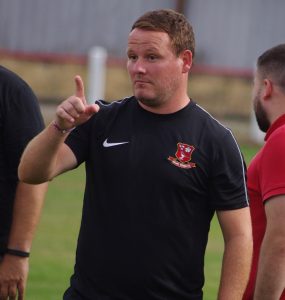
Christian Fox has totally changed the fortunes of Selby Town
Q. Since taking charge of Selby Town, your team has a great reputation for a ‘swash-buckling’ style of play which seems to generate lots of goals. What precisely is your coaching philosophy?
A: “We have a booklet for the academy and it is 30 or 40 pages long and it is our philosophy.
“That goes from the three-year-olds, right up to the Seniors. We have it for Selby as well. There’s different systems, how we want to play and basically covers everything.
“My philosophy is fast-paced attacking football. That’s how I want my teams to play. Out from the back and through the thirds. Some games dictate whether you want to do that. Weather conditions dictate whether you can do that. Opposition teams dictate whether you can do that.
“We try and believe in the players to try and play like that. As a management team we have created the system, but we’re not trying to reinvent the wheel.
“We went along to our interview for the Selby job with the plan of how we wanted to play and the sort of players who would fit into our plans. We had a list of players that we wanted to get. We got some of them, but not all.
“I think we have been successful with implementing our philosophy. It takes time to work and it is always evolving. It needs constant work. We work on different things in training each week and it always based around our system (4-3-3).”
Q. Selby Town now have an identity and are now respected in the community again. What is your Club Philosophy?
A: “The club philosophy has evolved with our own club philosophy which is to try and involve the community and get as many fans down as possible.
“We are doing quite well with that. It is something we wanted to do when we came in. We wanted more fans through the door because clubs like Selby rely on people coming through the gate. Attendances are going up all the time so we’re really happy.
“It shows how successful you can be if you have plan as well as a coaching and club philosophy. Philosophies also give you targets and something to work to or on. Rather just turning up for a game or for training without any real focus.
“When you’re going into a new club there has be a plan. You have to sit-down with the committee or the owners and plan for the next three or five years. As a coach and club you have to have an identity so everyone is playing or working within the same philosophy.
“You look at York City and I think they have lost their identity. You look at the turnover of managers and players, no matter what philosophy you have, you will never achieve anything if you have that kind of turnover.”
Q. As a Manchester United supporter, you will remember that delegation played a big role in why Sir Alex Ferguson was so successful in the latter stages of his reign. Does delegation play in your management style?
A: “If you think back a few years, a manager was someone who did the coaching, did the tactics, picked the team, did the coaching from the side of the game.
“Nowadays, a good manager is someone who can pick the right people to have around and put them in the right place. Delegation is a good thing because responsibility is given to everyone, not just one person.
“There’s a lot of delegation at Selby. (Assistant) Jonny (Bruce) takes a lot of the training sessions. He has responsibility for them, but he’s a good coach so that’s what he does. It takes a lot of pressure off me. You can’t do everything and you don’t have to do everything.
“In an assistant you don’t want something who is a ‘yes’ person. You need someone who is good at questioning certain ideas and have an input into team selection. Me and Jonny don’t always agree on certain things. Reuben Pearse and Chris Dowson also have their input too. I am surrounded by people with good ideas and I think you have to be.”
Q. Are you someone who is constantly searching for new coaching/management ideas?
A: “I do my learning mainly online, for both coaching ideas and management techniques. I read and watch things on the internet. I’m more of a take things in visually learner than a reader.
“I think it is important to keep learning new things. You have to keep evolving and keep picking up new ideas. Otherwise you stagnate. I watch more coaching videos, but I am interested in leadership and management techniques, not just in football, but in other sports. I like to learn about how they run things.”
Q. At York, you played with Swansea City manager Graham Potter. He achieved so much in Sweden and we’ve now seen former Garforth Town manager Adrian Costello be successful there too, as well as Potter’s Ostersunds successor Ian Burchall. What do you think to Potter’s achievements and how fair is it to say that English coaches will continue moving abroad for opportunities that are now available in England?
A. “He was always someone you could see going into coaching because he was always a voice in the changing room.
“He always had his own ideas on the training pitch. Tactically he knew what he was on about. I’m not surprised he went into coaching. He started off like people coaching in the league (with Leeds Carnegie) we are in now and he obviously inspires you.
“I do think if Graham Potter had tried to work his way up the English Football Pyramid he probably wouldn’t have got to where he is now with Swansea. But you just have to try and be successful at the club you’re at and see where that leads. I think you’re only going to move up if you’re successful.
“But I can see a lot of English coaches moving abroad for opportunities. I don’t know how many English coaches are in the Premier League now, there’s only five or six. It is a small percentage.
“It is a shame. The UEFA B and A Licenses are expensive so if opportunities aren’t forthcoming in this country, I suppose more will go abroad for them.
“I’d be up for coaching abroad and I have thought about it. If the opportunity was right for myself and my family, I would consider it. It would be a major dilemma because you have to think about uprooting your family or leaving them here.
“I do talk to Adrian a lot, but I haven’t been approached for anything.”

